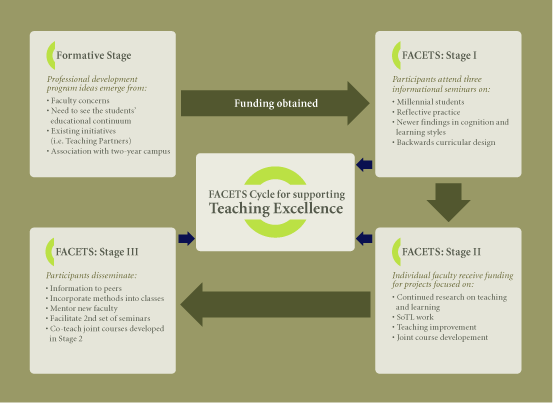

FACETS Cycle
for Supporting Excellence
Four Aspects
of the Program
Four Aspects of the FACETS Program

Formative Stage
Professional development program ideas emerge from:• Faculty concerns
• Need to see the students’ educational continuum
• Existing initiatives (i.e. Teaching Partners)
• Association with two-year campus
Stage I: Informational seminars
Participants apply for admission and receive:• 3 dinner/seminars
• Featured professional books and related handouts
• Support and ideas through follow up discussions and related
• Activities with peers, facilitators, and university students
• $100 for related books or software
Dinner presentations, activities, and collaborative discussions and exchanges offer participants insights into:
• Reflective practice
• Learning differences and expectations of Millennial students
• Latest research on cognition and information retention
• Relationship of learning styles to what we know about human cognition and retention
• Recent educational theory and data about effective curricular redesign and student assessment
Follow-up:
• Participants are required to disseminate materials to home units
• Seminar attendees may stop participation after the seminars or submit research proposals for Stage 2 as summer stipends or as course release time
Stage II: Supported projects
Through competitive application Stage 1 participants are eligible for summer stipends ($3500 with fringes) or support for course release (up to $5000)Criteria for award are:
1. Quality of the statement of intent: Inclusion of a succinct focused discussion on the relationship of the researcher’s intention for professional growth to the programs foci
2. Congruence with FACETS objectives. Appropriate topics should relate to teaching excellence through:
• Understanding generational differences
• Investigation of new or alternate teaching techniques
• Altering teaching presentations
• Comprehensive revisions of existing syllabi or courses
• New or integrated course development
• Research on the Scholarship of Teaching and Learning
• Investigation of methods of evaluating teaching interventions
• Revisions or creation of student activities or interactions, or assessments
• Investigations into newer theories, and the like.
3. Agreement to implement research and share findings with peers and other professionals
FACETS: Stage III
Participants disseminate:• Information to peers
• Incorporate methods into classes
• Mentor new faculty
• Facilitate 2nd set of seminars
• Co-teach joint courses developed in Stage II
![]()